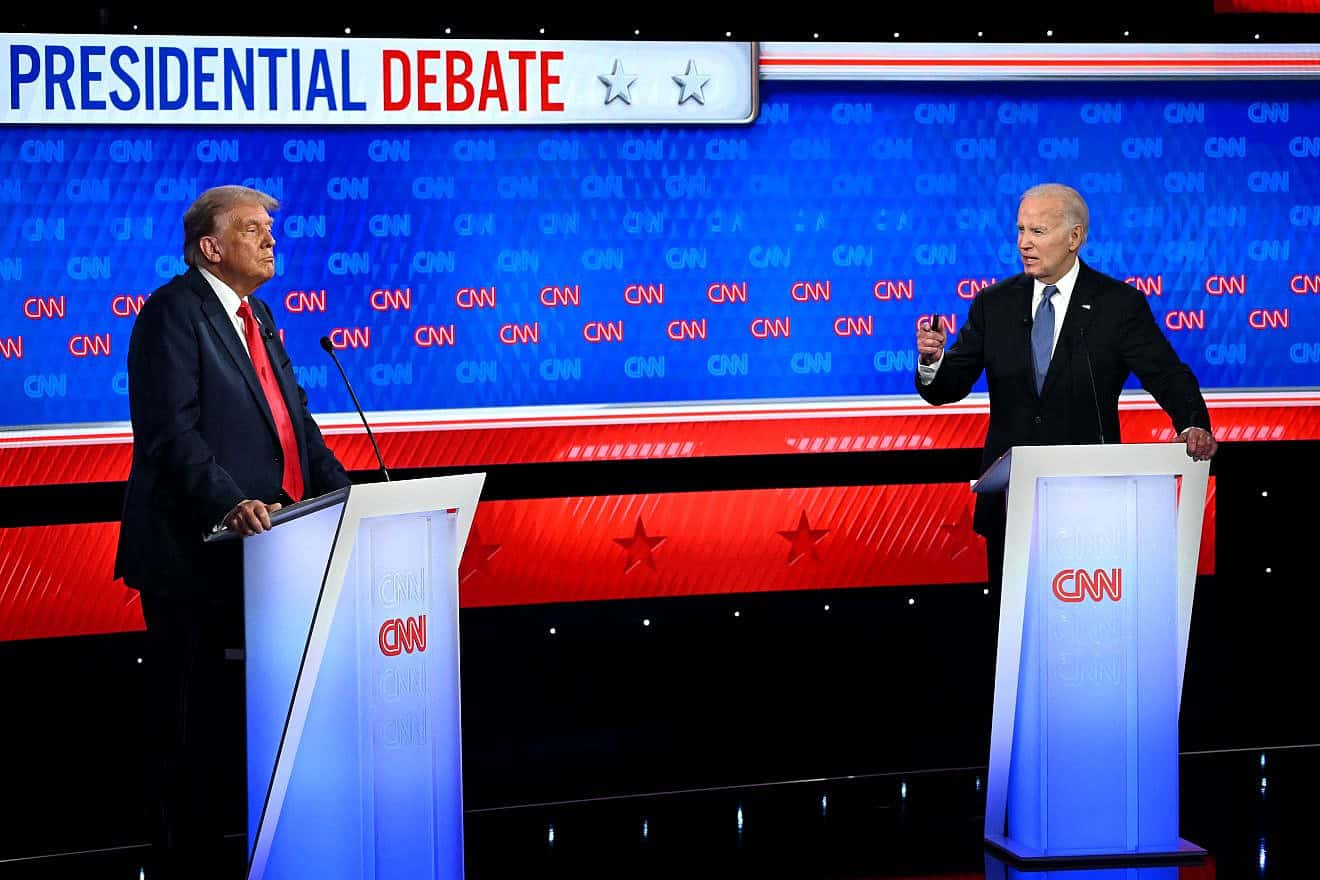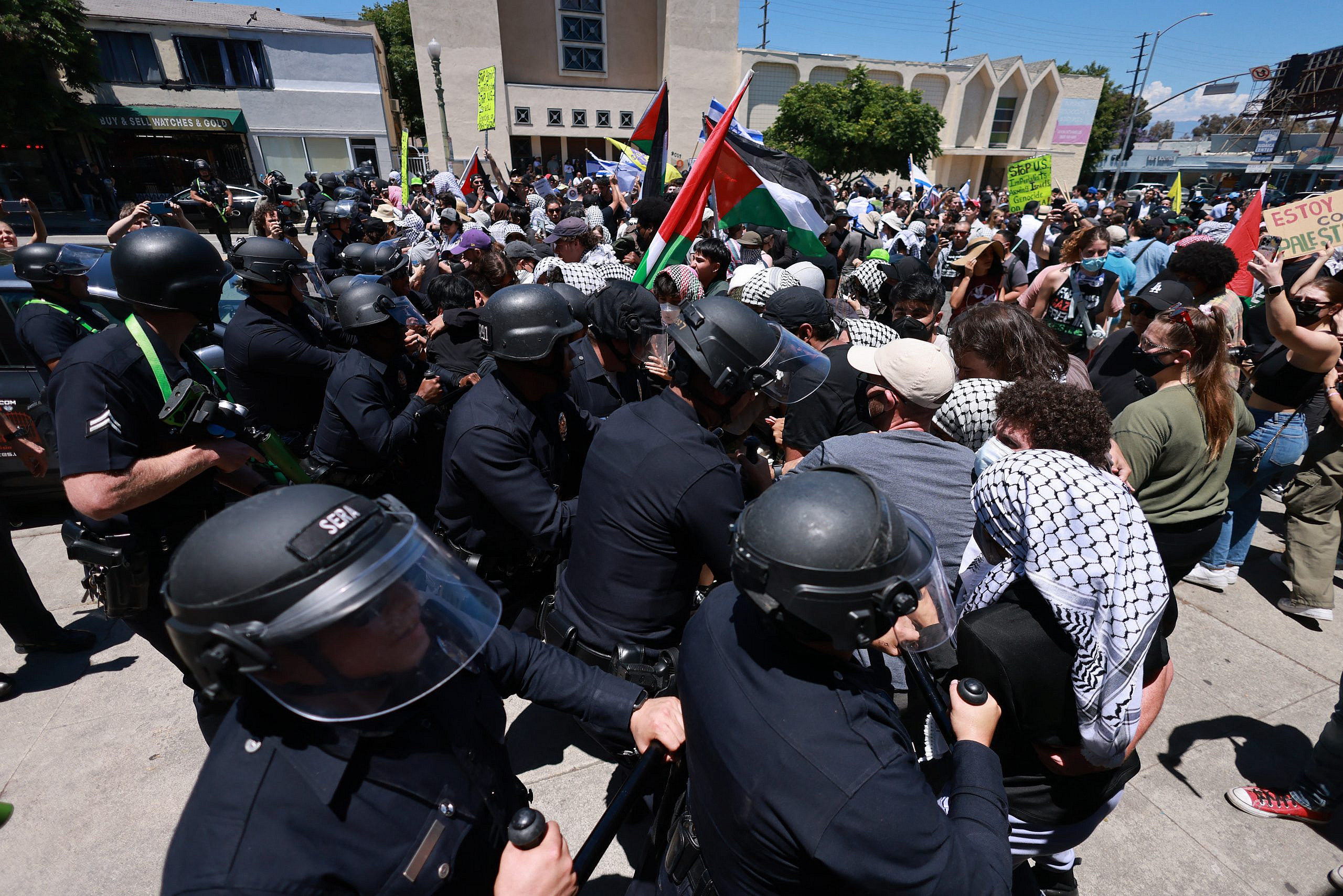Why are we failing to respond to ‘1,000 Charlottesvilles?’
The surge in antisemitism received only a fleeting mention in the Biden-Trump debate. But lost amid the fallout over its outcome is a serious question about fighting hate.
By Jonathan S. Tobin
JNS
Jun 28, 2024

The full implications of the outcome debate between President Joe Biden and former President Donald Trump have yet to be seen. The encounter was a unique event in political history in that the president’s faltering and sometimes confused performance was such that not even his most rabid supporters could deny that it confirmed doubts about his age and infirmity. While that didn’t stop the partisan vitriol from continuing to flow between Democrats and Republicans, it did set off speculation about the Democrats replacing Biden as their candidate.
But though that topic overshadowed the substance that was discussed, one point of contention amid the word salads of insults, hyperbole and untruths uttered by both men was noteworthy, even if it only was raised in passing. At a time when the nation is wracked by an unprecedented surge in antisemitism, what little mention that topic received deserves further analysis.
Though it didn’t figure prominently in the debate, Israel’s post-Oct. 7 war on Hamas in Gaza and the subsequent surge in antisemitism in the United States did come up.
Arguing about Israel and Hamas
When asked about the Middle East, Biden boasted of his support for Israel and denied that he was failing to give them the weapons they need. He said that “Hamas cannot be allowed to be continued [sic],” which is in line with his initial pledge of support for Israel’s goal of destroying the terrorist group that governed the Gaza Strip before and during the Oct. 7 atrocities. But then, he also boasted of his ceasefire plan that whether he wants to admit it or not, if accepted by Hamas (which it has not been) would ensure their survival.
Trump’s reply was mostly devoted to revisiting earlier arguments about Ukraine and Russia, though he did say that Israel should be allowed to “finish the job” of defeating Hamas, a clear difference between the two. He followed that with a characteristic insult flung at his opponent saying, “He’s become like a Palestinian. But they don’t like him because he is a very bad Palestinian. He is a weak one.” It’s not clear exactly what that means but suffice it to say that it probably offended both Palestinians and Democrats.
Trump was then asked by CNN moderator Dana Bash if he supported an independent Palestinian state, which is an unrealistic suggestion that Biden and the American left continue to cling to. He could have said that he had offered them a path to one in the Mideast peace plan that he put forward in 2020, which Palestinians rejected, as they have every other chance to gain independence and end their century-old war on Zionism. Instead, he simply said that he would think about it and then launched into a digression about trade, NATO and Russia.
But an equally important Jewish issue arose later.
Relitigating Charlottesville
In the course of his attack on Trump as an alleged threat to democracy, Biden revisited his claim that he entered the 2020 presidential race because of the “Unite the Right” neo-Nazi rally held in Charlottesville, Va., in August 2017 and that Trump had called the neo-Nazis “very fine people.”
The truth is that Trump did not say that. He actually condemned the neo-Nazis and Ku Klux Klan members who took part in that event but did defend those who opposed the removal of a statue of Robert E. Lee. Indeed, just last week, the Snopes.com fact-checker site finally got around to labeling that charge “false.”
It was especially wrong of Biden to bring it up again. The myth about Trump endorsing Nazis is significant not just because it has been fodder for Democratic rhetoric for the past seven years, long after it was initially debunked. It was also the foundation of a fundamentally mistaken assumption about antisemitism in the United States promoted by liberal Jewish groups like the Anti-Defamation League.
Right-wing hatemongers—like the few hundred extremists who showed up in Charlottesville with tiki torches, as well as lone gunmen like those who attacked synagogues in Pittsburg, Pa., and Poway, Calif.—are a real threat. But they are a marginal phenomenon with no political influence, let alone a link to the Trump White House, as many on the left falsely asserted.
It also served to distract from the growing threat of antisemitism on the left, which, unlike the neo-Nazis, has genuine political influence.
A surge in antisemitism
Since Oct. 7, Americans have witnessed mobs of protesters in the streets of their cities and especially on college campuses not merely chanting slogans in support of the Hamas terrorists and their genocidal goals of destroying Israel (“from the river to the sea”) and killing Jews (“globalize the intifada”). They also engaged in hundreds, if not thousands, of acts of antisemitic violence and intimidation against Jewish students and ordinary Jews at work or at their houses of worship.
In April, Biden was asked if he condemned these actions, and he responded with exactly the sort of reaction that he continues to insist that Trump uttered about Charlottesville. “I condemn the antisemitic protests. That’s why I have set up a program to deal with that,” he told a press gaggle. “I also condemn those who don’t understand what’s going on with the Palestinians.”
This was deeply wrong since it equated those engaging in open antisemitism with people who might not accept the exaggerated and largely false claims of Palestinian casualties or a non-existent famine in Gaza that the Biden administration has itself promoted.
He also spent much of the year doing his best to appease elements of his party, like the mayor of Dearborn, Mich., who is an avid supporter of Hamas, to get them to support his re-election campaign. The man who says he ran for president to oppose right-wing antisemites has, to his shame, been currying favor with Jew-haters, albeit those who identify with the political left or the Muslim-American community, even praising rather than condemning Rep. Rashida Tlaib (D-Mich.), who is vocally open about her desire for Israel’s destruction and support for Palestinian terrorists. While Biden can chide Trump for his association with antisemites like Kanye West, he can’t do so without exposing himself to criticism for his ties to the intersectional, Israel-hating wing of his own political party, including its representatives in Congress.

Los Angeles police officers clash with anti-Israel protesters outside Adas Torah, an Orthodox synagogue, preventing access to an event on June 23, 2024.
Just last week, a pro-Hamas mob attacked a Los Angeles synagogue and then went on a rampage throughout the Jewish neighborhood where it was located. To his credit, Biden condemned that assault. But in contrast to the way that he has weaponized the U.S. Department of Justice to go after what he considers to be right-wing extremists or opponents of abortion, his administration has taken a pass when it comes to doing anything about antisemitic violence, other than a meaningless plan issued last year that involved legitimizing an antisemitic organization like the Council of American Islamic Relations and equating Jew-hatred to the fictional threat of Islamophobia.
In his closing remarks, Trump returned to Charlottesville and issued what might stand as the one statement uttered by either candidate during the 90-minute debate that could not be legitimately challenged. Referencing the anti-Israel protests in which “Palestinians and we have everybody else rioting all over the place,” he added the following: “You talk about Charlottesville. This is 100 times Charlottesville. 1,000 times.”
The Charlottesville march scared American Jewry to death because the torches evoked Nazi rallies of the 1930s and those who uttered the threats to Jews were familiar villains, the same right-wing hatemongers who had plagued Jewish communities, here and elsewhere, throughout the last century.
Mainstreaming antisemitism
Since then, Americans have, in fact, witnessed hundreds and even thousands of Charlottesville-style events in which Jews are slandered, intimidated, threatened and even subjected to violence, including at their houses of worship. Yet rather than these incidents uniting the nation in revulsion, as was the case after Charlottesville, much of the corporate mainstream media and a significant segment of Biden’s own party have rationalized or excused these outrages.
The pervasive influence of toxic woke ideologies like intersectionality and critical race theory that have become the new orthodoxy in the American education system, media and culture has promoted the lie that Jews and Israel are “white oppressors,” and therefore deserving of opprobrium, if not terrorism. In this way, a form of antisemitism has become acceptable in mainstream discourse in a manner that right-wing hate is not.
We don’t know who will be elected president in November. But one of the most important tasks facing whoever it is that proclaims the oath of office next January will be to take up the cause of challenging this newly respectable variant of antisemitism. And it will require more than just talk. It will mean rolling back the woke ideological tide and cracking down on violent Hamas supporters on our campuses and in our streets. Fighting this battle against a wave of hate that threatens Jews today, but ultimately aims at toppling the foundation of Western civilization and American liberty, shouldn’t be a Democratic or Republican issue. We should all pray that it doesn’t remain one.
No comments:
Post a Comment